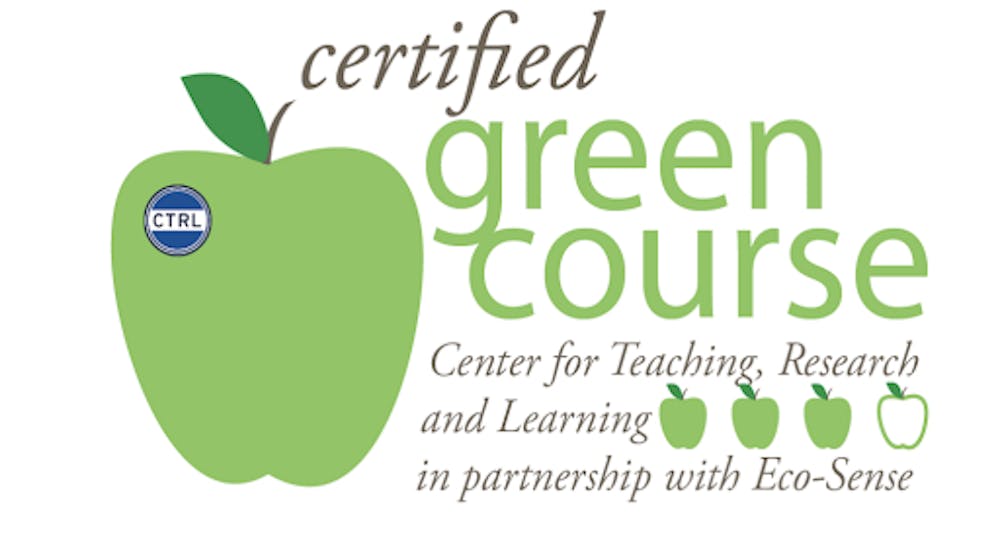On Canvas, you may have noticed some of your professors displaying an emblem on their page that reads, “Certified Green Course.”
The Green Teaching Program, which provides the “Certified Green Course” emblem, is run by the American University Center for Teaching, Research & Learning. The program has AU faculty members commit to certain sustainability measures in their classroom to be awarded a “Green Teaching Certificate.”
Anna Olsson, a full time staff member in the CTRL and an adjunct professor in the School of Public Affairs, started the Green Teaching Program in 2008 in partnership with EcoSense, a former environmental group for students on campus.
Olsson said the idea came to her when she started teaching while getting her master’s degree at AU.
“The idea came up when I was teaching my first course. I noticed immediately … that I used so much paper,” Olsson said. “It felt like I really started thinking about whether I really needed to print so much for my students and for myself.”
Olsson researched green teaching programs before jumping into creating her own at AU, but she couldn’t find a program that met the standards she had in mind. As a result, she collaborated with EcoSense and other professors to create the first “Certified Green Course” questionnaire.
If AU professors are interested in converting their class to a “Certified Green Course,” they must fill out the 55 question survey that asks them about their sustainability practices and encourages them to commit to various actions. These options include posting handouts and syllabi electronically.
Some of the requested commitments are more challenging than others, such as eating vegetarian meals while on campus, or biking to work. As a result, the certificate has four levels, and in order to advance levels, a professor must reach a certain number of points. More points are awarded for the more sustainable measures professors commit to.
Olsson said that the program essentially functions as an honor system. There is not much holding the professors accountable for adhering to their sustainability commitments other than an optional scorecard faculty can hand out to their students at the end of every semester reviewing the sustainability practices utilized by the professor.
For Olsson, though, the program is about challenging professors to think about their actions, which is why they must reapply every academic year to maintain their certification.
“It's just essentially reviewing your own habits and thinking about how they impact your students,” Olsson said. “And the bigger picture of the University as a whole.”
Danielle Vogel, a professorial lecturer in the Kogod School of Business who teaches sustainability and entrepreneurship classes, has made use of the Green Teaching Program.
“It seemed like a very natural fit to express my commitments to sustainability to our students,” Vogel said. “It's also a great way for professors who aren't necessarily as invested in sustainability overtly, to check in on little tiny, incremental ways that they can improve their practices, both for environmental benefit, and in alignment with AU's commitment to sustainability.”
For the 2022-2023 academic year, the program currently has 206 professors certified, but since 2008, over 900 professors have participated.
“It's exciting to see how it spreads, once you can get professors to commit to this, and then also students will be interested in it,” Olsson said. “We have students who go and ask their professors who are not certified.”
According to Olsson, not only has the program taken off across AU, but other universities and colleges have reached out to her, starting their own green teaching programs inspired by AU’s. Olsson labels the program as a grassroots initiative because of how she founded it and how it challenges individuals to reconsider their own habits and actions.
“The cumulative effects of doing some things versus not doing them, in terms of sustainability, can be pretty large. It's both the actual concrete things you do that actually do save resources, like paper [and] energy,” Olsson said. “But even more so, or at least equally, it's about fostering awareness. I'm helping both, any community member, be it faculty, staff or students, become more aware of the effects of their behavior.”
Vogel pointed out that the program is only a net positive for students, staff and faculty, because it asks professors to make modest shifts in their teaching practices and is a helpful addition to their classroom, rather than an impediment.
“I've found throughout my career that often, the more environmentally sensitive decision is also the more economic and time efficient decision,” Vogel said. “Living these values and living these standards can actually help you save time. You're not only more resource efficient, but you can be more time efficient, as well.”
Olsson is very satisfied with how the program has turned out.
“I'm just really proud of the professors at AU, all of them who have taken the time to be part of the program and to recommit every year, to give suggestions for how we can improve it,” Olsson said. “And then to execute these measures that they have committed to in the classroom … I think it's really, really cool that so many of them have committed to this, and I feel like we're making real change. It's a really good feeling.”
This article was edited by Hannah Langenfield, Kylie Bill and Abigail Pritchard. Copy editing done by Isabelle Kravis, Sarah Clayton and Leta Lattin
klalonde@theeagleonline.com





